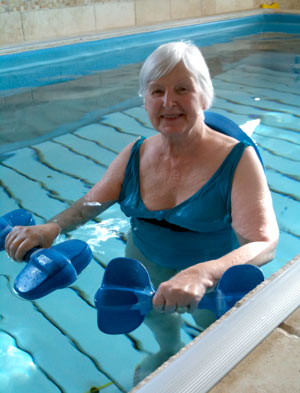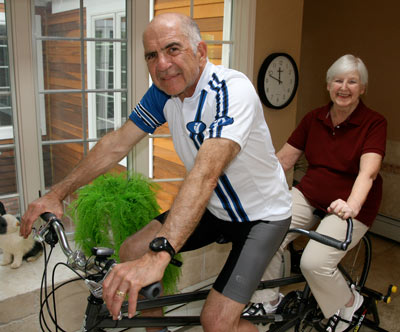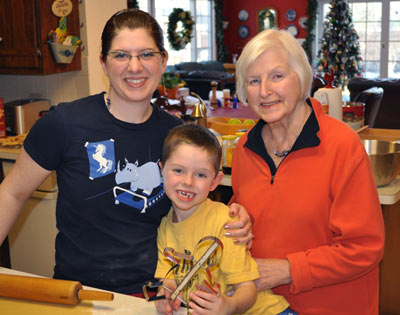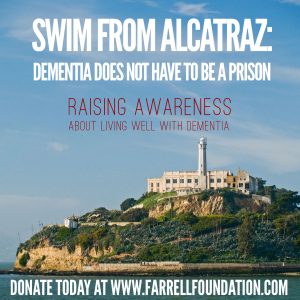Videos
Thank you from our participants and volunteers.
An Introduction
A Care Partner’s Perspective
Swimming From Alcatraz.
Dr. Charlie Farrell, 82 years old, is swimming from Alcatraz to San Francisco in July of 2019. As an advocate for people with dementia, in the Alcatraz swim, swimming away from the prison, Dr. Charlie wants to share the message that dementia does not have to be a prison and you can live well with dementia.
Dr. Charlie started out as a marathon runner over 40 years ago and grew into a multi-sport athlete- running, biking, and swimming. Throughout his journey swimming has always been a constant that has allowed him to keep moving through injury, movement restrictions, and the changes of aging.
At the Carolyn L. Farrell Foundation, we run programs for people with dementia and their carepartners. The first thing we often hear when educating people about dementia is that dementia is like a prison and life with dementia is bleak. We show people another way. We help people live well with dementia through providing engaging activities, information about environmental modifications, and a supportive community. We also share information about how to improve life with dementia through exercise and other lifestyle enhancements.
 One of the first lifestyle interventions Dr. Charlie used to help his wife, Carol, live well with Lewy Body Dementia was an Endless Pool. Lewy Body Dementia is dementia with Parkinson’s symptoms which includes tremors of the hands and other parts of the body. Exercise helps to decrease tremors in Lewy Body Dementia and the Endless Pool was an accessible and safe way for Carol to exercise and be in community with her friends, who called themselves “The Mermaids.”
One of the first lifestyle interventions Dr. Charlie used to help his wife, Carol, live well with Lewy Body Dementia was an Endless Pool. Lewy Body Dementia is dementia with Parkinson’s symptoms which includes tremors of the hands and other parts of the body. Exercise helps to decrease tremors in Lewy Body Dementia and the Endless Pool was an accessible and safe way for Carol to exercise and be in community with her friends, who called themselves “The Mermaids.”
 Exercise is essential to healthy aging, but even moreso to improving the lives of people with dementia. Exercise increases blood flow to the brain, which helps the brain function better. It allows people to sleep better and sleep is when the brain clears itself of the amyloid plaques which contribute to Alzheimer’s Disease. Challenging the brain by doing new things increases neurological functioning in the brain, keeping the brain healthier and allowing the brain to make neural connections faster and increase memory and the ability to make decisions.
Exercise is essential to healthy aging, but even moreso to improving the lives of people with dementia. Exercise increases blood flow to the brain, which helps the brain function better. It allows people to sleep better and sleep is when the brain clears itself of the amyloid plaques which contribute to Alzheimer’s Disease. Challenging the brain by doing new things increases neurological functioning in the brain, keeping the brain healthier and allowing the brain to make neural connections faster and increase memory and the ability to make decisions.
 When a person with dementia has more access to their memory and better ability to move, their life opens up more. They can take walks with their family. They can choose what they want for lunch and help cook simple recipes. They sleep better and thus so does their care partner. When hand tremors decrease for a person with Lewy Body dementia, they are able to dress and feed themselves, when they could not before.
When a person with dementia has more access to their memory and better ability to move, their life opens up more. They can take walks with their family. They can choose what they want for lunch and help cook simple recipes. They sleep better and thus so does their care partner. When hand tremors decrease for a person with Lewy Body dementia, they are able to dress and feed themselves, when they could not before.
Dementia does not have to be a prison when we use as many appropriate interventions for people with dementia as we can.
 What is the swim from Alcatraz?
What is the swim from Alcatraz?
- The swim from Alcatraz holds many mysteries, partly becoming popular after the 1979 film, “Escape From Alcatraz,” based on the true story of three men who broke out of the Alcatraz prison in 1962. They were never found and some say they attempted to swim from the prison to San Francisco and never made it through the treacherous waters. There are stories of swimmers having run-in’s with sharks, or drowning from being unable to handle the cold temperatures and rough currents.
- The swim is about 2 miles long and in the past was assumed to be nearly impossible.
- Before the swim can be attempted, the tide and currents needs to be checked. Swimmers must be proficient swimmers and have trained enough to be able to swim 140 lengths of a 25-yard pool, according to Odyssey Open Water Swimming, who will be monitoring Dr. Charlie’s swim. They will follow him in a boat with a support crew including a Coast Guard Certified Captain and experienced Odyssey guides. They will monitor the currents and advise Dr. Charlie of the safest route.
Resources:
The End of Alzheimer’s: The First Program to Prevent and Reverse Cognitive Decline by Dale E. Bredesen, MD
Pedaling for Parkinsons
Physical Exercise and Dementia
Why We Sleep by Matthew Walker, PhD
